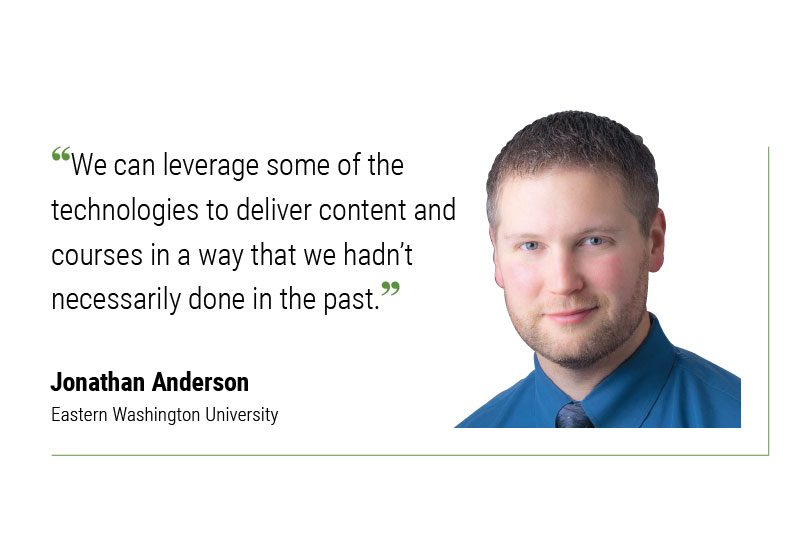
Home » EWU accounting program to become its own school
EWU accounting program to become its own school
Most faculty to be based in new Catalyst Building

April 22, 2021
With just a little more than two months to go, nearly all the pieces are in place for the department of accounting to embark on becoming its own formal School of Professional Accounting.
The formal designation is scheduled to take effect July 1.
“We’re elevating the status of the accounting department to make it even more comprehensive,” says Arsen Djatej, the chair of EWU’s accounting department.
Founded in the late 1960s, the accounting department historically has been one of EWU’s more popular courses of study. Djatej says EWU accepts – and graduates – accounting majors on a year-round basis. Currently, more than 300 students have declared accounting as a major.
The move is part of campuswide reorganization initiative that has been about two years in the making. The goal of the reorganization is to make the educational experience more efficient and leaner for students, says Jonathan Anderson, currently the dean of the College of Social Sciences and interim dean of the College of Business.
Another goal for the university is to use its faculty resources to improve cross-discipline education and training for students, Anderson says.
As an example, Anderson says, “There could be great ways that the school of business and the school of psychology could interact.”
He points to a subdiscipline field of study called industrial organizational psychology in which students learn about the application of fundamental psychology principles in business.
Meanwhile, Djatej says he thinks there will be opportunities for the university to help business students develop soft skills more effectively – such as communication and writing – that they will need upon entrance into the workforce.
“In the school of business, we don’t have those kinds of programs, so we’re going to appeal to other departments to help us provide those skills,” he says.
As part of EWU’s overall academic reorganization, the university plans to move most of its College of Business faculty and administration into the Catalyst Building, which is located on the 500 block of East Sprague Avenue in Spokane’s University District, east of downtown.
The school of accounting will continue to offer the same academic curriculum on the university’s Cheney campus.
For now, classes will continue to be taught virtually through the summer months with an expected return to in-person learning in September, Anderson says.
The accounting school will reside under the purview of the new College of Professional Programs for which he will become dean, effective July 1.
The professional programs college also will oversee the business and administration, education, interdisciplinary studies, libraries, and psychology programs.
Anderson began working at EWU in 2006 and Djatej started the following year. They think the university’s reorganization will have a positive effect on accounting.
Says Djatej, “I’m very excited about the school of accountancy. I think we’re going to be put on the map in ways that we haven’t been before.”
Those affiliated with the university’s accounting disciplines are continuing to revise the school’s curriculum and adjusting it to contemporary issues more reflective of today’s accounting world, Djatej says.
Djatej credited Anderson with soliciting feedback from local and regional accounting firms to get their opinions as to how the university could make the school of professional accounting more applicable in today’s business climate.
“Higher ed is going through hard times, and a lot of schools are getting shut down,” Djatej says. “But the bottom line is that accounting will remain at Eastern firm and solid, and we’re looking forward.”
Though COVID-19 proved to be disruptive to higher education at large, Anderson and Djatej say the fact the university began its reorganization plans before the arrival of the coronavirus may have helped prepare the university to reemerge from the pandemic better.
Still, Anderson anticipates there will be some parts of the pandemic-induced virtual world that will last going forward.
“Some individuals will say, ‘I can’t wait to get back to how things were,’ and I’m very quick to say we will never be back to where we were in fall 2018 or 2019,” he says. “There have been some adjustments, not only in the education, but on the learning side, where we can leverage some of the technologies to deliver content and courses in a way that we hadn’t necessarily done in the past.”
Community workshops, webinars, and teach-ins will continue to remain a part of the university’s educational landscape for the foreseeable future.
“Getting more familiar with Zoom and Microsoft Teams has allowed us to reach a broader number of individuals,” he says.
Latest News Up Close Education & Talent
Related Articles
Related Products



